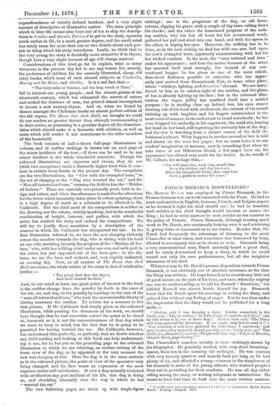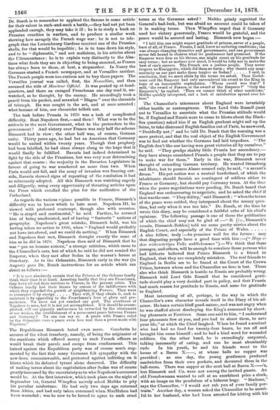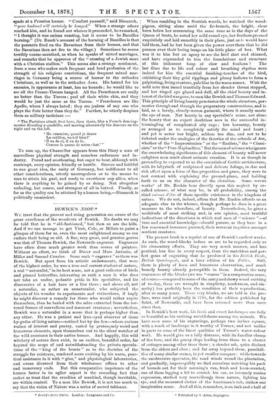PRINCE BISMARCK BOSWELLIZED.*
Di:. Montrz Buscim was employed by Prince Bismarck, in the Franco-German war, on work connected with the Press. Ile had to mark such articles in English, German, French, and Belgian papers as he deemed it right his chief should see ; he bad to translate such articles as the chief thought would interest or amuse the King ; he had to write answers to such articles as ran counter to the policy of Prussia. Prince Bismarck, although trusting much work to Dr. Busch, was continually looking over it and criticising
it, giving hints or commands as to the future. Besides that, Dr. Busch bad frequently the advantage of listening to the great Chancellor at meal-times, and sometimes was honoured by being
allowed to accompany him as he drove or rode. Bismarck being a very conversational man, Busch naturally heard a great deal, and he wisely determined to keep a diary, in which he could record not only his own performances, but all the weightier utterances of his chief.
Whatever may be Dr. Busch's present disposition towards Prince Bismarck, it was obviously one of absolute reverence at the time the Diary was written. He hugs himself as he records any little act of good-nature on the part of his hero, and once, when the mighty one was so condescending as to call his Boswell " Biischlein," the faithful Boswell was almost beside himself for joy. Bismarck knew that Dr. Busch spent his evenings in writing the diary, and quizzed him without any feeling of anger. But he was then under the impression that the diary would not be published for a long while :—
" Abeken said I was keeping a diary. Bohlen remarked, in his lively way, 'Yes, he writes, "At 3.45, Count So-and-So said this." and he will swear to it one of these days.' Abeken then said, 'The Diary will form material for historians. If we could only live to read it Yes, certainly it will form material for historians,' I answered, and very trustworthy material, though possibly not fin. thirty years yet.' The Chief [i.e., Bismarck] smiled ; 'People will then say, "Conferas Busehii, chapter three, page twenty."
The Chancellor's ceaseless activity is most strikingly shown by his biographer. He generally worked, with very short breathing- spaces, from ten in the morning till midnight. He was content with very homely quarters and homely food (so long as he had plenty of it), and afforded a strange contrast in the simpleness of his demands to some of the young officers, who worried people's lives out in providing for their comforts. He was all day either riding among the army, or writing telegrams or instructions. He seems to have had time to look into the most various matters.
• Graf Biamarck and seine Lenin, taihrml des KriNs nit Frankreich. By Dr. Moritz
n. Leipzig: runow. 1878. *
Dr. Busch is to remember to applaud the Saxons in some article for their valour in such-and-such a battle,—they had not yet been applauded enough, they may take it ill ; he is to study a book on Prussian cruelties in warfare, and to produce a similar work showing how savagely the French wage war ; he is not to tele- graph that the Luxembourg Gardens received one of the Prussian
shells, for that would be impolitic ; he is to tone down his style, and to be "diplomatic," and not malicious, in his articles about
the Ultramontanes ; he is to explain very distinctly to the Alsa- tians what fools they are in objecting to being annexed, as France has always been to them, at best, a stepmother. In Nancy the Germans started a French newspaper, and at Versailles another. The French people were too curious not to buy these papers. The Versailles journal was called, first, the Nouvelliste, and then assumed the title of Moniteur Officiel. It was posted up at head-
quarters, and there an enraged Frenchman one day read it, un- watched, as he thought, by the enemy. He accordingly took a pencil from his pocket, and scrawled " Blague " over the chronicle of triumph. He was caught in the act, and at once arrested ; what became of him, our chronicler telleth not.
The task before Prussia in 1870 was a task of complicated difficulty. Beat Napoleon first,—and then ? What was to be the attitude to the next Government, what to the pretenders to the government? And victory over France was only half the scheme Bismarck had in view ; the other half was, of course, German unity. Thirty years ago, he had bet an American that Germany would be united within twenty years. Though that prophecy had been falsified, he had since always clung to the hope that it would finally be fulfilled. Bavaria had indeed determined to fight by the side of the Prussians, but was very near determining against that course ; the majority in the Bavarian Legislature in favour of going to war numbered no more than two. When Paris would not fall, and the army of invasion was freezing out- side, Bavaria showed signs of repenting of the resolution it had so reluctantly adopted. All this Bismarck was watching eagerly and diligently, using every opportunity of thrusting articles upon the Press which extolled the plan for the unification of the Fatherland.
As regards the various rjginaes possible in France, Bismarck's difficulty was to know which to hate most. Napoleon III. he viewed with profound contempt, though also with aversion. "He is stupid and sentimental," he said. Farther, he accused him of being uneducated, and of having " fantastic " notions of geography. Napoleon's great mistake, Bismarck held, was his having taken no action in 1866, when "England would probably not have interfered, and we could do nothing." When Bismarck and Napoleon first met, Bismarck thought exactly the same of him as he did in 1870. Napoleon then said of Bismarck that he was "pas un homme inirieux," a strange criticism, which came to the Chancellor's ears, but of which he said he did not remind the Emperor, when they met after Sedan in the weaver's house at Donchery. As to the Orleanista, Bismarck early in the war (in August) gave Dr. Busch instructions for an article which ran about as follows :- • "It is now absolutely certain that the Princes of the Orleans family think their time is at hand. Asserting loudly that they are Frenchmen, they have offered their services to France, in the present crisis. The Orleans family lost their throne by reason of the indifference with which they regarded the growth of neighbouring Powers. They want to reconquer it by energy. They will, if they obtain it, seek to maintain it by appealing to the Frenchman's love of glory and pre- eminence. We havo not yet reached our goal. The overthrow of Napoleon is near, but it is not yet accomplished. If it should be accom- plished, will our gigantic endeavours be rewarded by the attainment of our wishes, the establishment of a permanent peace between Franco and Germany ? No one can say so. A peace with France ruled by the 01 leanists were a peace even loss real than a peace made with Napoleon."
The Republicans Bismarck hated even more. Gambetta be accuses of the vilest treachery, namely, of being the originator of the manifesto which offered money to such French officers as would break their parole and escape from confinement. This hatred against the Republican party was of course much aug- mented by the fact that many Germans felt sympathy with the new-born commonwealth, and protested against inflicting on it blows which its defeated tyrant alone deserved. The difficulty of making terms about the capitulation after Sedan was of course greatly increased by the uncertaintyas to who Napoleon's successor would be. At the first interview, which took place on the night of September 1st, General Wimpffen naively asked Moltke to pity his peculiar misfortune. Ile had only two days ago returned from Africa, and had only taken command when MacMahon had been wounded ; was he now to be forced to agree to such cruel terms as the Germans asked ? Moltke grimly regretted the General's bad-luck, but was afraid no account could be taken of it in making terms. Then Wimpffen urged that if Germany used her victory generously, France would be grateful, and the peace would be assured and lasting. Bismarck now began
I told him one might expect gratitude of princes, never of a people, least of all, of France. France, I said, knew no enduring conditions. she was always changing dynasties and governments, and one government never felt bound to observe what its predecessor had promised. If the Emperor were firm on his throne, one might count on his gratitude for easy terms ; but as matters now stood, it would be folly not to make the best of one's success. The French are a jealous people. They never forgave us Koniggrfitz, which did them no harm ; why should any mag- nanimity on our part make them forgive us Sedan? . . . . . I said, in conclusion, that we must abide by the terms we asked. Then Castel- neau said the Emperor bad only surrendered his sword to the King in hope of an honourable capitulation. 'Whose sword was that ?' I said, 'the sword of France, or the sword of the Emperor?' Only the Emperor's,' he replied. 'Then we cannot think of other conditions,' Moltke quickly interposed, and a look of satisfaction spread over his face."
The Chancellor's utterances about England were invariably either hostile or contemptuous. When Lord Odo Russell (sent Out to Versailles to ascertain what the Prussian attitude would be, if England and Russia were to come to blows about the Black- Sea question) asked him if an English gunboat might sail up the Seine, to take distressed English families out of Paris, he answered, "Decidedly not ;" and he told Dr. Busch that the rescuing was a mere pretext, and that the real object of the English Government was to find out whether the Germans had laid torpedoes. "The English don't like our having won great victories all by ourselves,"
he said. "They grudge shabby little Prussia her ascendancy,— they have always considered Prussia a people that they are to pay to make war for them." Early in the war, Bismarck never
thought of extending German territory. He wanted Strassburg and Metz, but to possess Alsace seemed only, be said, "a savant's dream." His pet notion was a neutral borderland, of which the inhabitants should furnish no contingent of soldiers either to France or Germany, but should pay Germany taxes. At the time when the peace negotiations were pending, Dr. Busch heard that England was endeavouring to negotiate, and he asked the chief if that was the case. "They did try," said Bismarck ; "when the terms of the peace were settled, they interposed about the money ques- tion, but only when it was too late." Dr. Busch, at the time he wrote this diary, may be considered a faithful echo of his chief's
opinions. The following passage is one of those the publication of which the chief may not be glad of :—" B. [i.e., Bismarck's
cousin, Bismarck-Bohlen] told me some pretty stories about the English Court, and especially of the Prince of Wales A nice fellow, truly !—he promises well for the future ; may
that disgusting people have a good time with him :—(" Mlige er dent widerwartigen Volke wohlbekonimen").—We think that these passages, and others, will be enough to convince those persons who
had hitherto believed that Prince Bismarck is a friend to England, that they are completely mistaken. The real friends to
England in Berlin are to be found at the Court of the Crown Prince, between whom and the Chancellor no love is lost. Those also who think Bismarck is hostile to Russia are probably wrong. Bismarck told Lord Odo Russell that he considered grati- tude should play a very decided part in policy, and that Prussia had much reason for gratitude to Russia, and _none for gratitude
to England.
Most interesting of all, perhaps, is the way in which the
Chancellor's own character reveals itself in the Diary of his ad- mirer. He has a certain bluff good-nature, and was not angry when he was chaffed about disobeying the King's command by shoot- ing pheasants at Ferrieres. Some one said to him, "1 understand four pheasants flew at you, and you had to shoot them, to save your life," at which the Chief laughed. When he found a sentinel who had had no food for twenty-four hours, he ran off and brought him some himself ; and he had a kind word for wounded soldiers. On the other hand, he is exceedingly corporeal, talking incessantly of eating, and can be most abominably
rude. In his youth, he and his friends went to the house of a Baron X—, at whose balls no supper was provided ; so one day, the young gentlemen produced sandwiches from their own pockets, and devoured them in the ball-room. There was supper at the next ball at Baron X—'s, but Bismarck and Co. were not among the invited guests. An old Frenchwoman wanted to sell at an exorbitant price a clock, with an image on the pendulum of a hideous bogy. "Madame," says the Chancellor, "I would not rob you of your family por- traits." Another day, a woman asked the Chancellor to be merci- ful to her husband, who had been arrested for hitting with his spade at a Prussian hussar. "Comfort yourself," said Bismarck, "your husband will certainly be hanged." When a strange odour reached him, and he found out whence it proceeded, he remarked, "I thought it was onions roasting, but it seems to be Bazeilles burning." (Dr. Busch's account of the burning of Bazeilles is that the peasants fired on the Bavarians from their houses, and that the Bavarians then set fire to the village.) Sometimes he seems terribly coarse-mouthed, as when he speaks of mixed marriages, and remarks that he approves of the "crossing of a Jewish mare with a Christian stallion." This seems also a strange sentiment, from a man who makes such frequent and loud profession of the strength of his religious convictions, the frequent mixed mar- riages in Germany being a source of horror to the orthodox Christians, as well as to the orthodox Jews. His hatred for his enemies, in appearance at least, has no bounds ; he would like to see all the Francs-Tireara hanged. All the Frenchmen are really no better than the Turcoa ; peel off their white skin, and they would be just the same as the Turcos. "Frenchmen are like Apollo, whom I always hated ; they are jealous of any one who plays the flute better than they do." Further, he utterly despises them as military tacticians :— "The Parisians attack first here, then there, like a French dancing- master directing a quadrille, and moving alternately the dancers on the right and on the left.
comMere, plena je dense La cotillon, va-t-il bien?'
vs de ci, il vs de la, Comm° la queue de notre chat.'" To sum up, the Chancellor appears from this Diary a man of marvellous physical strength and ceaseless endurance and in- dustry. Proud and overbearing, but eager to hear, although with contempt, every opinion, friendly or hostile. Sincere and faithful to one great idea, the unity of Germany, but indifferent to all other considerations, utterly unscrupulous as to the means he uses to attain his goal, and ready to overthrow any allies, when there is anything to be gained by so doing. Not altogether unfeeling, but coarse, and strongest of all in hatred. Finally, as far as the quality can be attained by a human being,—Bismarck is politically omniscient.








































 Previous page
Previous page